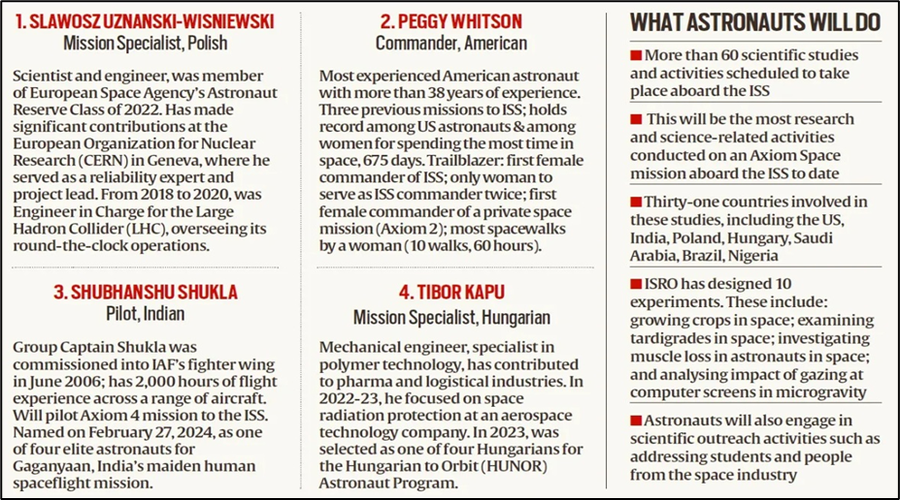Why in News?
Indian astronaut Shubhanshu Shukla’s trip to the International Space Station (ISS) on the Axiom-4 mission will be a big step forward for India’s space journey.
In recent years, ISRO has done many important missions, like the Chandrayaan-3 Moon landing, which made India one of the few countries with advanced space technology.
Shukla’s spaceflight is not India’s own human space mission yet, but it is closely linked to our plans. It will give useful information for the upcoming Gaganyaan mission and future space projects. This shows that India is getting ready for bigger achievements in space.

What’s in Today’s Article?
- From Rakesh Sharma to Shubhanshu Shukla: A Journey of Progress
- Gaganyaan: A Complex and Critical Mission
- ISRO’s First Customised Space Experiments
- A New Chapter in India’s Space Journey
From Rakesh Sharma to Shubhanshu Shukla: A Journey of Progress
- Rakesh Sharma’s journey to space in 1984 was a proud moment for India and sparked public imagination.
- However, at that time, India’s space program was still very young, with limited infrastructure and no clear long-term human spaceflight plans.
- As a result, his achievement remained more symbolic than practical.
- Shubhanshu Shukla’s Mission: A Step Towards the Future
- Shukla’s flight on the Axiom-4 mission is different. It comes at a time when ISRO is a globally respected space agency, capable of handling complex missions.
- His mission is not just inspirational, but will also provide valuable experience and data for future projects, especially the Gaganyaan mission.
- India’s first human space mission, Gaganyaan, was initially planned for 2022. Though delayed, the Axiom-4 mission helps bridge the gap.
Gaganyaan: A Complex and Critical Mission
- India’s first human spaceflight mission, Gaganyaan, is far more complex than uncrewed missions due to the safety protocols and human factors involved.
- This adds layers of difficulty for ISRO as it prepares to send astronauts into space for the first time.
- Why Shubhanshu Shukla’s Experience Matters
- Shubhanshu Shukla, as the pilot of the Axiom-4 mission, will gain real-time experience that is invaluable for Gaganyaan.
- His hands-on learning in decision-making, orbital navigation, and spacecraft operations will bring real-world insights that cannot be replicated in simulations.
- Currently, only Rakesh Sharma has such experience, but that was with older technologies. Shukla’s updated exposure will help guide future Indian astronauts.
- India’s First Astronaut on the ISS
- Shukla will also become the first Indian to visit the International Space Station (ISS).
- His time aboard the ISS will provide him with key observations about how space stations function, which will be crucial for ISRO’s long-term plan to build its own space station.
- Building Institutional Knowledge for the Future
- Countries with successful space programs benefit when astronauts transfer their learning to future missions.
- Shukla’s two-week space mission will lay the groundwork for developing India’s future space capabilities, both for Gaganyaan and the proposed Indian space station.
ISRO’s First Customised Space Experiments
- The Axiom-4 mission marks ISRO’s first chance to conduct specially designed experiments in space, laying the foundation for future space research tied to India’s needs.
- Zero-Gravity and Muscle Behaviour Study
- One key biology experiment focuses on understanding muscle degradation in zero-gravity.
- Unlike Earth, where gravity affects muscle function, space allows researchers to isolate and study natural muscle changes, potentially offering insights into human health and aging.
- Indian-Specific Biological Experiments
- ISRO is also conducting experiments on moong dal sprouts and micro-algae, designed to explore space agriculture and food sustainability.
- These are especially important for long-duration space missions and for India’s own future space station plans.
A New Chapter in India’s Space Journey
- Shubhanshu Shukla’s spaceflight marks the beginning of a roadmap that aims for an Indian human Moon mission by 2040, reflecting ISRO’s long-term vision.
- Building a Strong Space Ecosystem
- To achieve such ambitious goals, India needs a robust space ecosystem with active private sector participation.
- This will lower costs, drive innovation, speed up technology development, and attract talent.
- Unlocking the Space Economy’s Potential
- The global space market is valued at $500 billion, expected to double by 2030.
- Despite ISRO’s global standing, India currently holds only a 2% share.
- The goal is to raise this to at least 10%, boosting national economic growth.
- Inspiring the Next Generation
- Events like Shukla’s mission can ignite young minds, especially school children, encouraging them to pursue careers in space.
- Unlike 40 years ago, today’s youth have real opportunities to be part of this growing sector.









